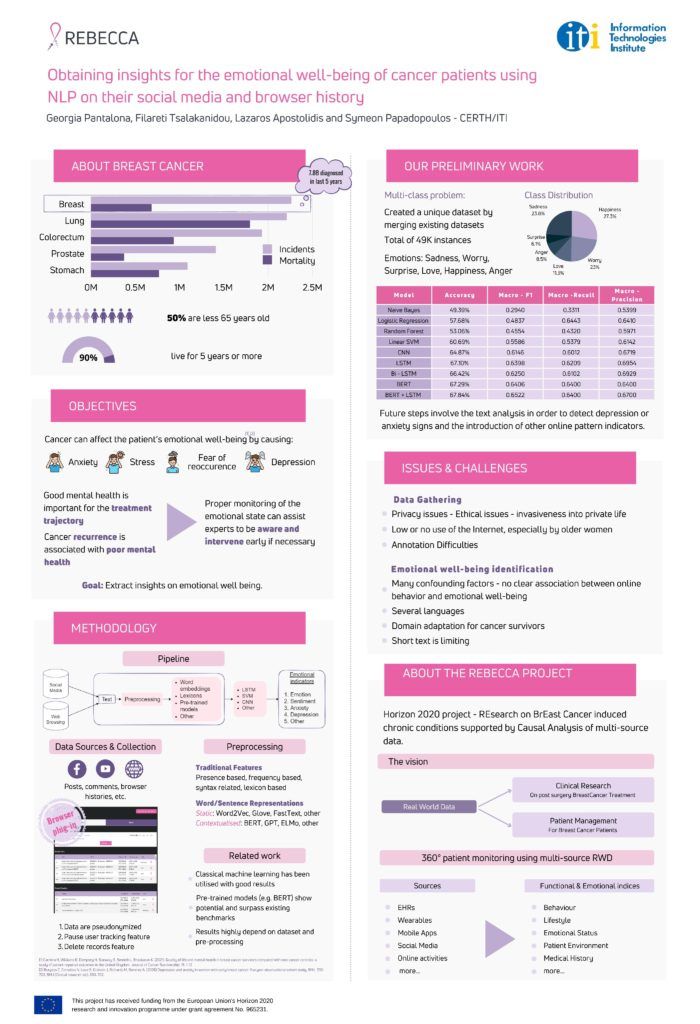REBECCA project featured at Applied Machine Learning Days 2022
On 28 March, the REBECCA project was featured at the Applied Machine Learning Days 2022. Ms Georgia Pantalona, Research Associate from the Centre for Research and Technology Hellas, presented the project in a dedicated track Applied NLP Technologies for Physical & Mental Health in Practice.
This year’s edition of Applied Machine Learning Days took place as an in-person event from 26 to 30 March at the Swiss Tech Convention Center in Lausanne, Switzerland. The event is considered to be one of the largest Machine Learning and AI events in Europe and it focuses specifically on the applications of Machine Learning and AI. Ms Pantalona held a presentation titled ‘Obtaining Insights for the Emotional Well-Being of Cancer Patients by the Use of NLP on Their Social Media and Browser History’, which focused on the work carried out on the REBECCA 360º platform. The REBECCA poster with the same title was featured during the event.
She began the presentation by providing an overview of the connection between Natural Language Processing (NLP) and emotional well-being, whereby NLP can be used for several purposes some of which are the diagnosis and treatment of mental health issues. She then introduced the REBECCA project, providing an overview of the REBECCA 360º platform.
Breast cancer patients undergoing treatment can face mental health issues, such as stress, depression, anxiety, and fear of recurrence, which can affect their Quality of Life. Ms Pantalona highlighted the importance of good mental health for the treatment trajectory of breast cancer patients[1]. She underlined that cancer recurrence is often associated with poor mental health[2], suggesting that proper monitoring of the emotional state is crucial so the patients can get the support they need[3].
Ms Pantalona then presented the REBECCA web browser plug-in, developed by the CERTH team. The plug-in, which is a Google Chrome extension, gathers data from social media, specifically Facebook and YouTube, and web browsers. The data gathered concerns social media posts, comments and reading materials patients engage with, as well as search queries and websites that they visit. She underlined that the data collected are pseudonymised which means that no personal data are collected.
The collected data are then preprocessed using several NLP techniques that aim to transform the written language into numbers that the Machine Learning (ML) or Deep Learning (DL) models can use. Later on, ML and DL classification models perform analysis that can indicate the meaning of the written text and the emotion it encapsulates. In this particular case, that means that the linguistic features of the content breast cancer patients produce and engage with online provide an insight into their emotional well-being.
Ms Pantalona underlined that the work done by the REBECCA project is still in its early stages and that the focus so far has been on the task of emotion recognition. There are numerous studies showcasing how ML and DL models can be used to achieve this. Pre-trained language models such as BERT also show a lot of potential. In their preliminary work, the CERTH team worked with 3 different public datasets for emotional recognition to analyse the following emotions: sadness, worry, surprise, love, happiness, and anger. They then applied classification models to the data to be able to identify emotion from language.
Ms Pantalona then presented some of the challenges in this area of work, including ethical issues associated with data collection, low or no internet usage by older breast cancer patients, difficulties arising in the interpretation of emotional well-being, in particular from short text, and no clear association between online behaviour and emotional well-being. Since the REBECCA studies will be conducted in three different countries, Norway, Sweden, and Spain, there is also the issue of multiple languages being used by breast cancer patients.
Ms Pantalona concluded the presentation by reflecting on the future steps in this area of work. The CERTH team will work on optimising the current models to improve results on emotion recognition. They will also focus on language analysis to detect depression or anxiety and attempt to incorporate data from online activity patterns, i.e. reactions to social media posts, and behaviour indicators, i.e. physical activity data into these models. The evaluation of the model and the generated data will be carried out within three REBECCA studies, mentioned above, that aim to improve the Quality of Life of breast cancer patients.
[1] M. Moreno-Smith, S. K. Lutgendorf, and A. K. Sood, “Impact of stress on cancer metastasis,” Future Oncol. Lond. Engl., vol. 6, no. 12, pp. 1863–1881, Dec. 2010, doi: 10.2217/fon.10.142.
[2] H. Götze, S. Taubenheim, A. Dietz, F. Lordick, and A. Mehnert-Theuerkauf, “Fear of cancer recurrence across the survivorship trajectory: Results from a survey of adult long-term cancer survivors,” Psychooncology., vol. 28, no. 10, pp. 2033–2041, 2019, doi: 10.1002/pon.5188.
[3] J. Singh Shrestha et al., “Social support, quality of life and mental health status in breast cancer patients,” Cancer Rep. Rev., vol. 1, no. 2, 2017, doi: 10.15761/CRR.1000107.

